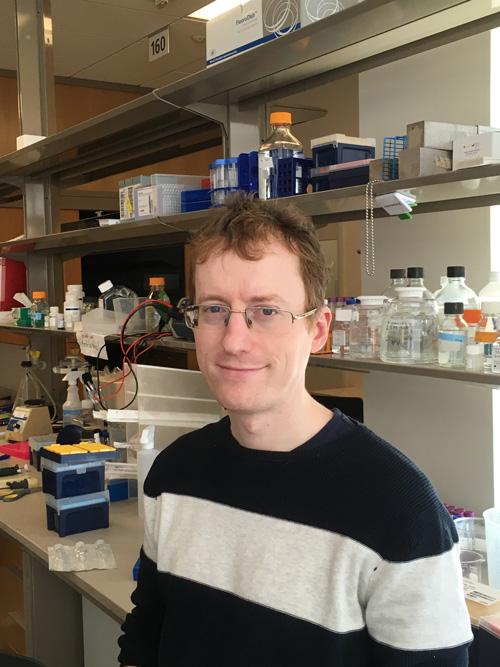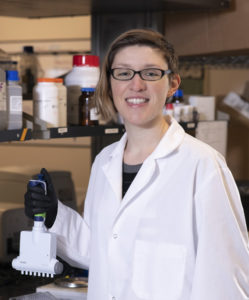

- Empowering Nonprofits & Scholars
- Activating Givers
- Engaging Volunteers & Key Skills Hub
- Key Skills Hub
- A New Century
- All About Us
- On the Table Philly
- Givers
- Professional Advisors
- Nonprofits
- Students
- Media
- Events
- Contact
- MyDonorPortal
- Give Now
Gabor Egervari, M.D., Ph.D., Perelman School of Medicine, University of Pennsylvania,
& Stephanie Matt, Ph.D., Drexel University College of Medicine, Named Recipients
PHILADELPHIA, PA. (5/29/2019) — The Philadelphia Foundation is pleased to announce that Gabor Egervari, M.D., Ph.D., Perelman School of Medicine, University of Pennsylvania and Stephanie Matt, Ph.D., Drexel University College of Medicine, are the 2019 recipients of the Brody Family Medical Trust Fund fellowships for medical research in incurable diseases.
The prestigious fellowships will fund two years of research by Dr. Egervari into brain changes from excessive alcohol consumption and by Dr. Matt of dopamine-mediated changes caused by drug abuse in HIV infection of immune cells.
“For those who have been diagnosed with an incurable disease, these fellowship offers hope and a new perspective,” said Pedro A. Ramos, President and CEO of the Philadelphia Foundation. “We are giving the best and brightest minds in our region the tools they need to do cutting-edge work that will change lives. The Brody family laid out this bold vision in establishing this fellowship program, and it is captured in Dr. Egervari’s and Dr. Matt’s ongoing research into diseases that have significant societal consequences.”

Dr. Gabor Egervari
Dr. Egervari received his M.D. from Semmelweis University in Budapest, Hungary in 2011 and his Ph.D. in neuroscience at Icahn School of Medicine at Mount Sinai in New York in 2017. He is now a second-year Postdoctoral Fellow in the Cell and Development Biology Department at the Perelman School of Medicine, University of Pennsylvania.
His research focuses on modifications that take place when small molecules generated by the breakdown of alcohol in the liver are deposited directly onto the chromatin (a complex structure of nuclear proteins and DNA) of brain cells. These modifications lead to changes in gene activity and, consequently, alcohol-related learning.
This novel mechanism – identified by Dr. Egervari and colleagues in Dr. Shelley Berger’s lab at Penn – is of critical interest to those in the addiction research field, as memories of alcohol-associated stimuli play a role in driving craving and relapse in alcohol use disorder. Results from his study could help identify new therapies.
An estimated 16 million people in the U.S. have alcohol use disorder, according to the National Institute on Alcohol Abuse and Alcoholism.
“Alcohol abuse presents a tremendous burden on individuals and society worldwide,” Dr. Egervari notes. “Effective treatments remain virtually non-existent, and many families continue to struggle with this chronic and recurring disease.”

Dr. Stephanie Matt holds a multi-channel pipette tool used to test protein levels
Dr. Matt received her Ph.D. in neuroscience at the University of Illinois at Urbana-Champaign. She is now a second-year Postdoctoral Fellow in the Department of Pharmacology and Physiology at Drexel University College of Medicine.
Her research focuses on the mechanisms of dopamine-mediated changes in HIV infection of immune cells known as macrophages. Dopamine, a neurotransmitter within the brain, changes the shape of CCR5, a protein that is often necessary for HIV to enter target cells. The use of illegal drugs — all of which act by increasing dopamine in the brain — is disproportionately prevalent within the HIV-infected population and can exacerbate HIV-associated neurocognitive disorders.
Understanding the relationship between drug-induced dopamine and progression of HIV infection will generate new therapeutic targets that will enable more effective tailoring of anti-retroviral therapy in HIV-infected drug abusers.
Globally, nearly 37 million people are infected with HIV and approximately 10 to 20% of them use illegal drugs.
Volunteering at a juvenile detention center in Illinois – where many of those she taught abused drugs – helped inspire Dr. Matt’s research interest.
“It fueled my desire to explore new neuro-immunological research avenues to understand the basis of disease in at-risk individuals such as drug abusers,” she said.
The prestigious fellowships provide an average of $70,000 a year for up to two consecutive years for full-time postdoctoral fellows in the early stages of their research into cutting-edge treatments for diseases that have a substantial societal impact and for which no consistently effective cure presently exists.
The fellowships are awarded from an endowed fund established by Sara Brody in memory of her brother, Dr. Louis Brody, her parents Dora and Hans Brody, her sister Ida Brody and her brother Benjamin Brody. Dr. Brody was a police surgeon and a family practitioner.
This year marks the eighth time fellowships have been awarded from the endowed fund. Past recipients have studied inherited blindness, ALS, Alzheimer’s Disease, Type I diabetes, heart disease, fibrosis (the overproduction of connective tissues which can result in a stiffening of skin and joints), motor function related to spinal cord injuries and ways to fight chronic infections such as HIV and cancer.
In selecting recipients, the Board of Managers of the Philadelphia Foundation is advised by a distinguished panel of physicians and scientists with expertise in medical research convened by The College of Physicians of Philadelphia. Fellowships are available to applicants who will be doing their research at Drexel University College of Medicine, Temple University School of Medici
Founded in 1918, the Philadelphia Foundation strengthens the economic, social and civic vitality of Greater Philadelphia. The Philadelphia Foundation grows effective philanthropic investment, connects individuals and institutions across sectors and geography, and advances civic initiatives through partnerships and collaboration. A publicly supported foundation, the Philadelphia Foundation manages more than 900 charitable funds established by its donors and makes over 1,000 grants and scholarship awards each year. To learn more, visit philafound.org.